Recently, TripAdvisor invited me to discuss basic Hotel SEO / SEM as a guest panelist on their “TripAdvisor Digital Marketing Demystified” webinar.
With respect to your hotel’s search engine optimization (SEO) and search engine marketing (SEM), do you feel overwhelmed? Unfortunately, for the beginner, when it comes to improving your hotel’s rankings it can sometimes feel as though the world is against you.
(Special note: What follows are my slides on hotel SEO / SEM and a breakdown of the talking points. During the presentation I only had 10 MINUTES to discuss a very complex subject. It should be noted that SEO / SEM have an almost infinite depth to them and this discussion barely scratches the surface and is meant to be a very basic introduction.)
Hotel SEO – How Search Engines Work
There are trillions of individual pages on the web. And when your potential guests start researching properties for their next vacation or business trip, SEARCH engines are tasked with parsing incredible amounts of information so that they return the most relevant and pertinent listings for peoples’ queries.
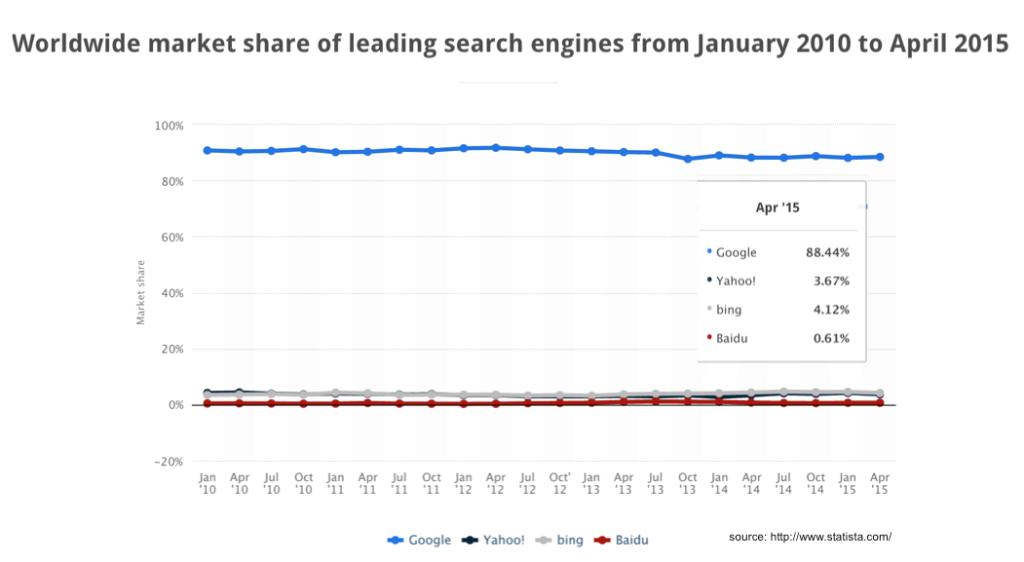
The graphic that you see above is the most recent information (that I could find) on the market share of various search engines that people use. If you consider the online activity of your guests, and the fact that you want them to be able to find you when researching their trip, you want to have a very good understanding of what platform your guests are using. (Note: Most likely it’s Google.)
As you can see in the graphic, as of April 2015 GOOGLE is still dominating with a little more than an 88% share of the market. Obviously a huge number, as such, the rest of this intro presentation focuses largely on Google.
Incredibly, Google handles some 40,000 searches per second or somewhere on the order of 4 billion searches per day! (Editor’s note: I found daily search stats that ranged from two billion to six billion.)
Search Engines can seem like mythical and confusing platforms for many hotel owners who might struggle to understand why their hotel’s website ranks where it does, and how they might go about gaining incremental improvement.
If you fall into this camp, you are not alone.
The question becomes then, when a potential guest searches for trip planning information, how does Google find web pages that match their query and determine the order of the search results?
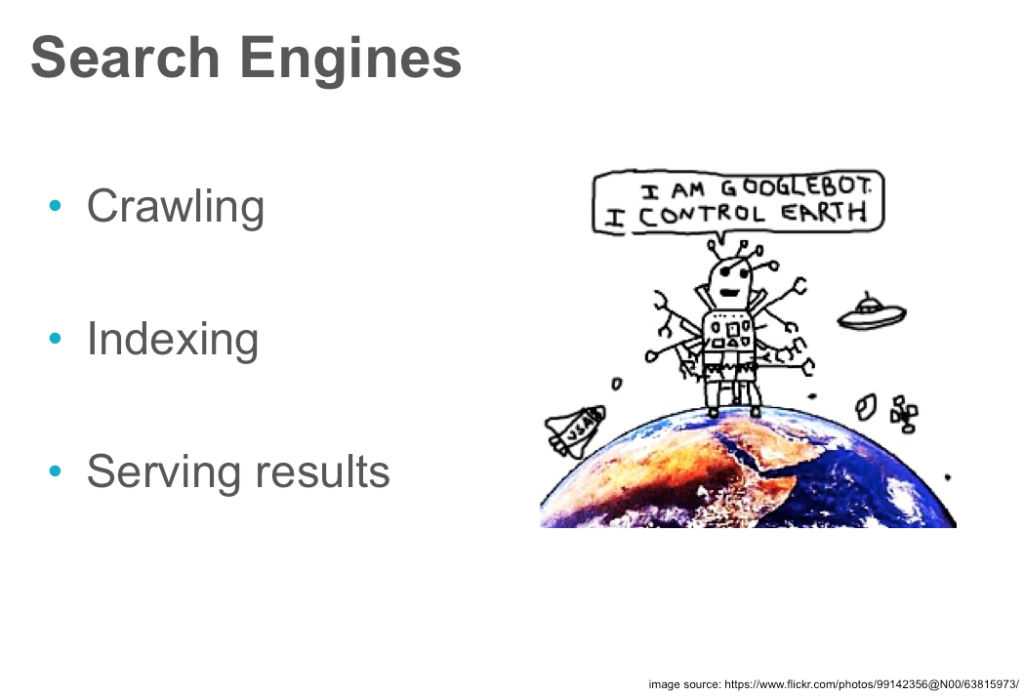
Googlebot – Google has a “web crawler” that is known as “GOOGLEBOT. ” The GOOGLEBOT is constantly crawling the trillions of pages on the web to determine new and updated pages that should be added to the Index and it accomplishes this by following links from page to page to page. So you want to ensure that your website is well structured and easily crawlable.
Index – GOOGLEBOT processes each of the pages it crawls and compiles them into a massive database called the Index. After Google has crawled and indexed your site it can then appear in the Search Engine Results Page (often shortened to the acronym SERP).
Results – When it comes to the search results, Google, of course, has a very specific and highly secretive algorithm that decides which pages are shown in which order.
Organic & Paid search – Google’s results page typically shows 7 to 10 links to sites which fit best with the keywords and phrases that your potential guests are searching.
- Paid search – with most all searches you might see the first few results with a little yellow ad icon or some other kind of designation. That means people have paid to rank well and the price varies depending on competition for the keyword. Paid search is the domain of Search Engine Marketing (SEM).
- Organic search – the other search results on the listings page are known as organic search results or non paid listings. Ranking well organically is the primary driver behind Search Engine Optimization (SEO).
Hotel SEO – Keywords
When you are thinking about SEO/SEM for your hotel, a critical component to understand is the concept of keywords. Keywords and phrases are the terms that your potential guests are typing into Google when researching their trip.
Having empathy for your audience during their travel shopping and research phase can help you to better understand what your guests are searching the internet for. You should be able to answer the following questions:
- Who is your target market?
- What is that market looking for in a hotel?
- What activities does your “ideal” guest like to do?
- What are the words and phrases that those people type into the search engines to find hotels that will suit their needs?
The example graphic below show us that the more specific you can get in your understanding of your guests, the better your sales funnel is going to be.
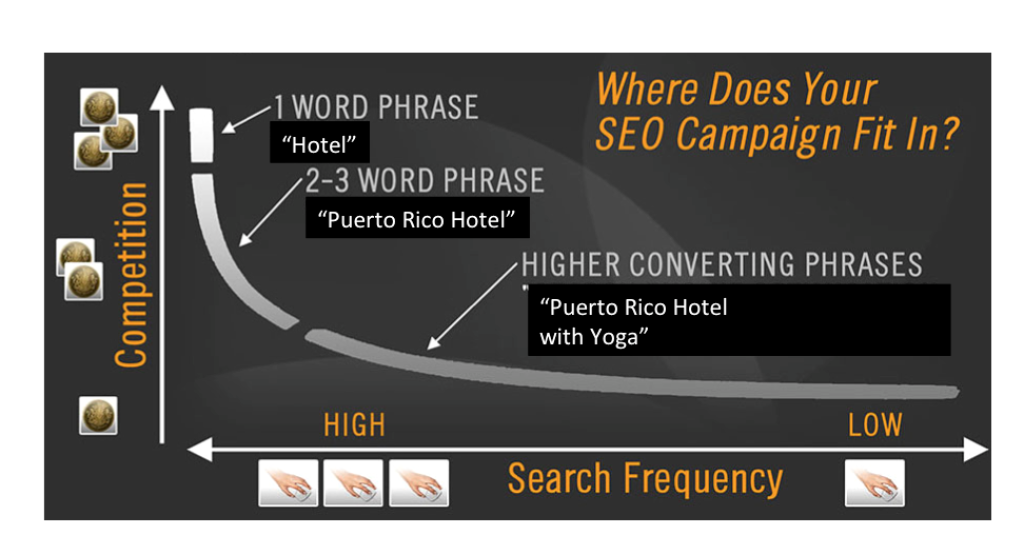 original image source: customerthink.com
original image source: customerthink.com
One word phrase – one word “hotel” is going to be extremely competitive, difficult to rank for, and it’s incredibly broad.
Two to three word phrase – a few words such as, “Puerto Rico hotel”, begins to narrow your niche down a bit, but the higher converting phrases tend to get even more specific.
Longer phrase (also know as the “Longtail”) – something along the lines of “Puerto Rico hotel with yoga” really starts to capture a specific segment of the market and tend to convert better.
Another tip to keep in mind, having your primary keywords and phrases in the text throughout your website — in your description, on your pages, and in blog posts lets search engines know what your site is about! Google is good at a lot of things. But if you don’t have information on your site about what your hotel is – then it’s going to be awfully hard for search engines to know.
Hotel SEO – Search Engine Marketing (SEM)
Search Engine Marketing is the promotion of websites and increasing their visibility in search engine results pages (SERPs) primarily through paid advertising.
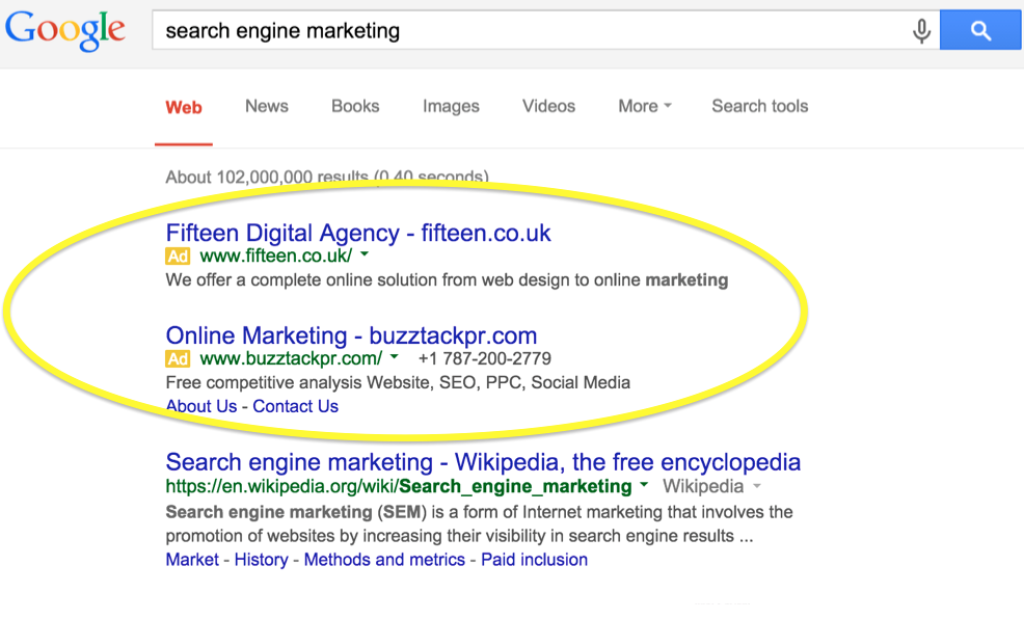
In the graphic above, you can see the paid results highlighted. With most all Google searches you might see the first few results with a little yellow ad icon. That means people have paid to have their business rank well. If you create Google ads for your hotel you are charged on a cost per click basis every time a potential guest clicks the ad link. The price varies depending on competition for the keyword or phrase.
It’s important to note that the paid ads are ranked in the results by what is known as the “Quality Score“. Quality Score is determined every time your keyword matches a customer’s search. The components include the expected clickthrough rate, the ad relevance, and the landing page experience.
Hotel Search Engine Optimization
Search Engine Optimization — SEO — is the practice of increasing your rankings in the organic (non-paid) search results. SEO is a component of Search Engine Marketing, and it should be noted that more than 75% of all clicks within search results are for organic versus paid links.
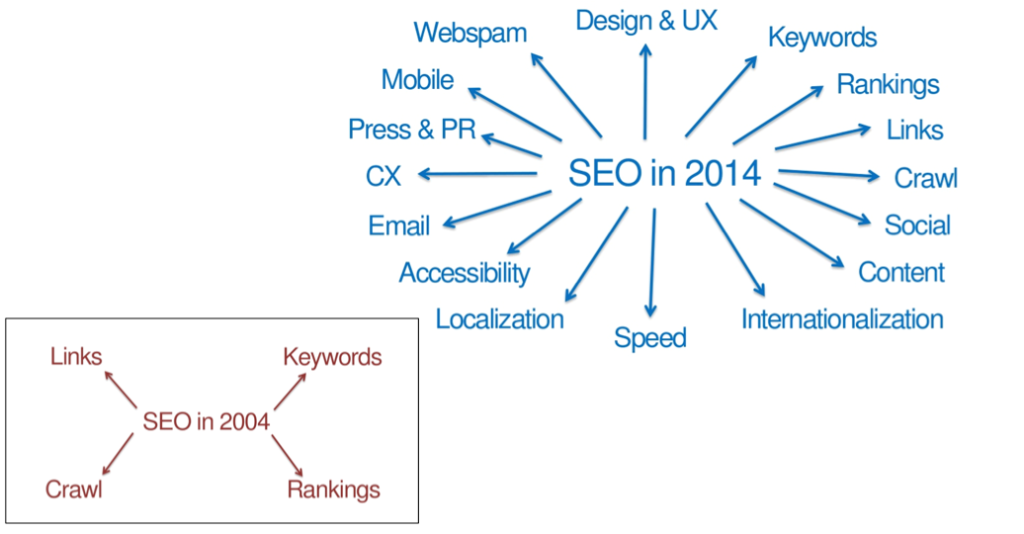
image source: moz.com
When it comes to your hotel SEO and ranking better in the search results, over time it has gotten quite a bit more complex. The smaller graphic (in red) here shows the components that you had to be concerned with for SEO in 2004. According to Moz, it was pretty much links, keywords, getting crawled, and rankings and you could expect a pretty good spot in the search results.
However, now just eleven years on we have to think about design, press, localization, site speed, keywords, social, mobile and on and on…
But it’s important for you to not get overwhelmed and understand you can still be successful!
Hotel SEO – A quick example
As you work on your hotel’s SEO and SEM strategy, the Google keyword planner tool can give you lots of information.
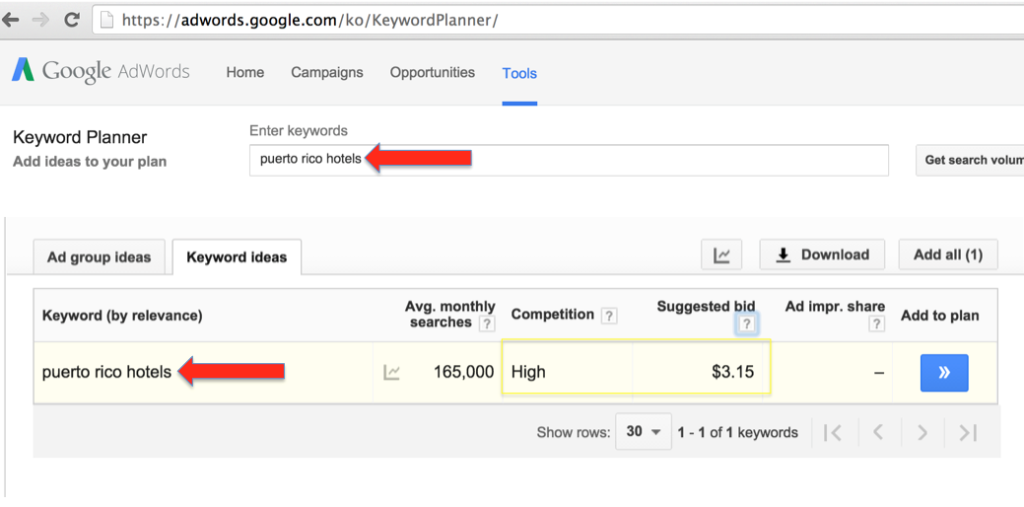
In the example “PUERTO RICO HOTELS” was entered. The results show us that people are searching for that term about 165,000 times per month and it’s competition is “HIGH”. If you wanted to bid on that phrase in Google Adwords it might cost around $3.15.
If you run an actual Google search for “PUERTO RICO HOTELS” you can see lots of ads and competition to rank highly.
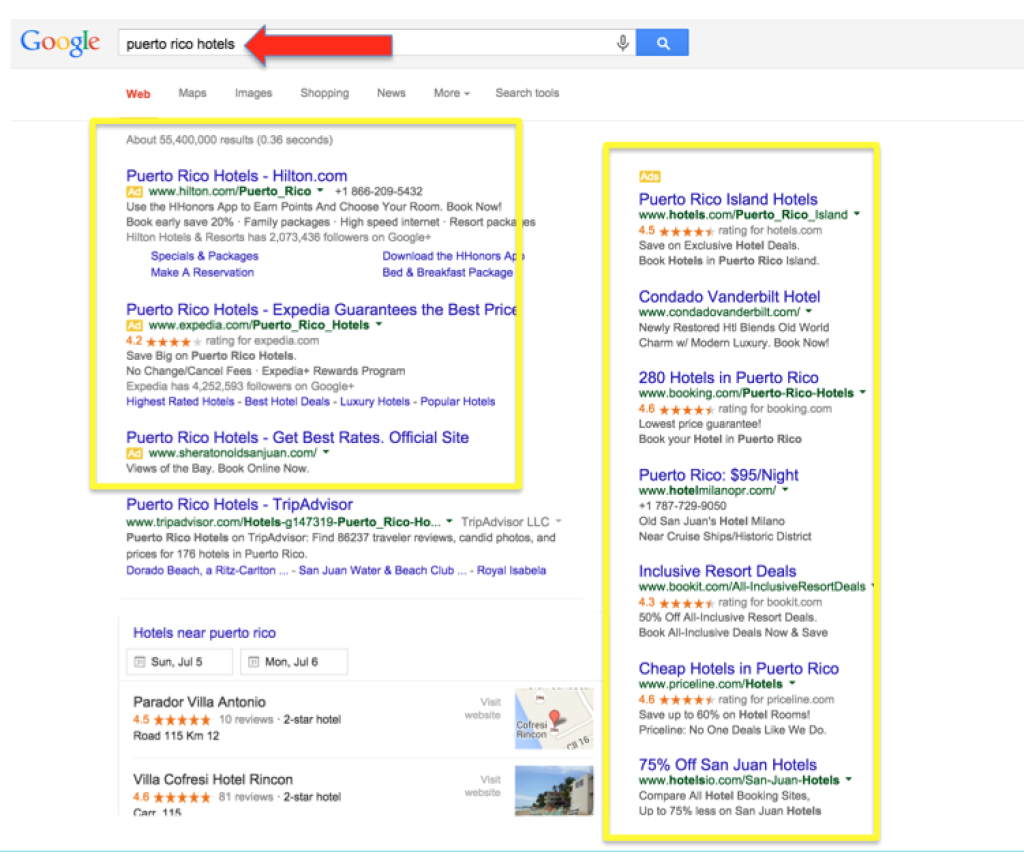
With all of the adds displaying before the organic listings, this show us that we might stand a better chance of ranking well if we drill down and get more specific about what our ideal guests are seeking.
As you can see, the search example below was for “PUERTO RICO HOTEL WITH YOGA”.
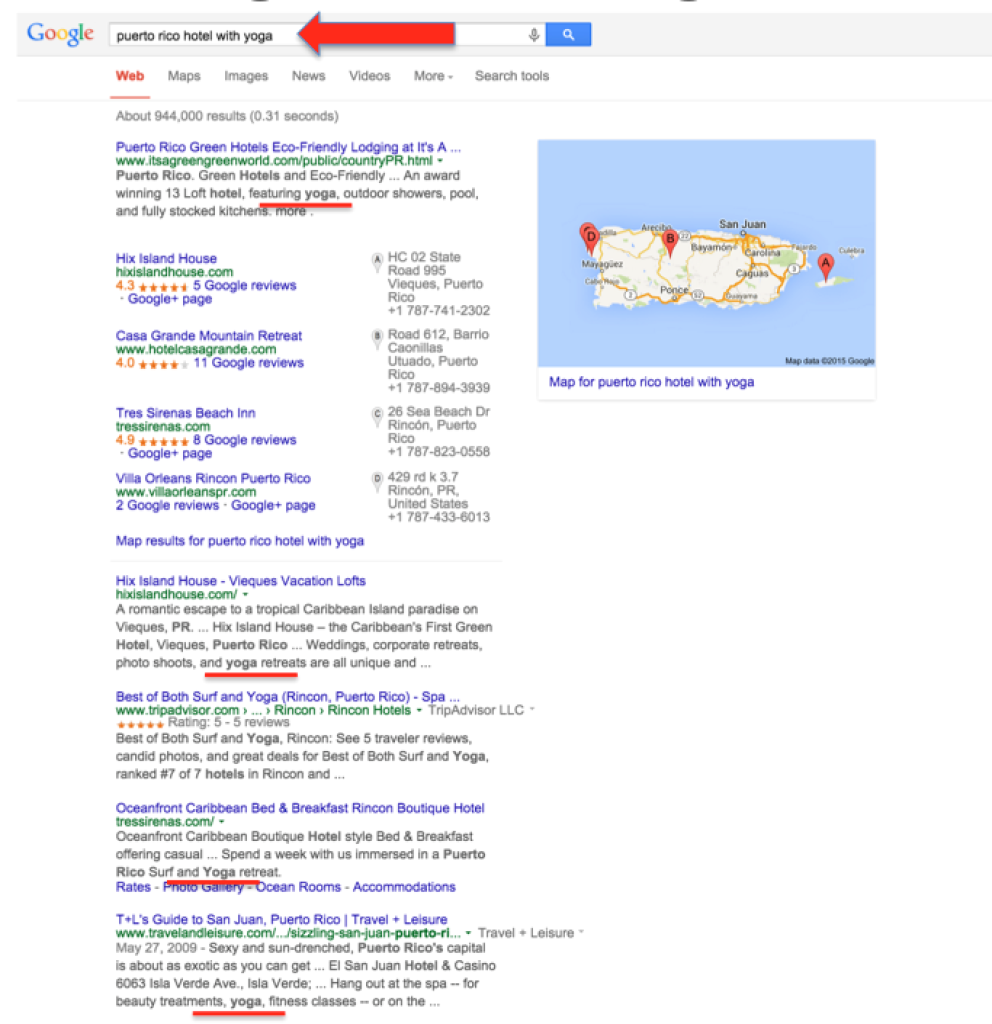
Notice, there are no ads and all of the listed results contain keyword “Yoga”! Additionally, if you see the results with the stars next to them, those hotels that have taken advantage of the SEO power of setting up a free Google+ business page. If you have not done this I highly recommend it.
Hotel SEO & SEM – Final Thoughts
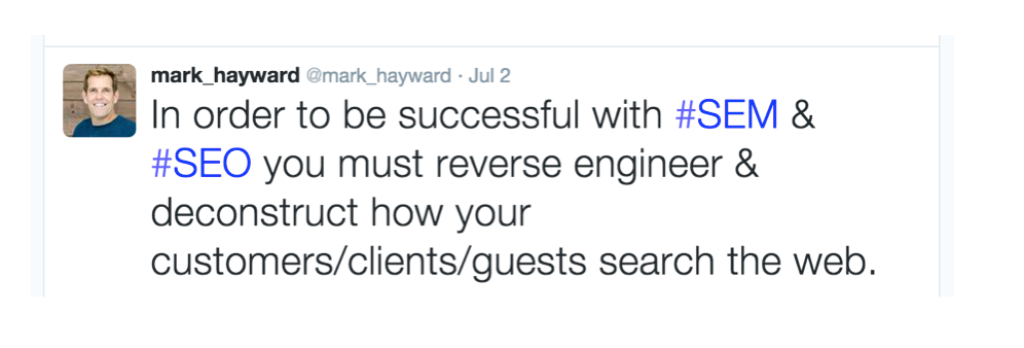
Some final thoughts for you to think about as you consider your hotel’s SEO and SEM strategy. In order to be successful with hotel SEO & SEM there are a tremendous amount of components and details that you need to understand.
Specifically, some of the facets that you want to think about would include the following.
- You need to have a deep understanding of your property and ideal guest.
- You want to focus on what you have control over.
- You want to maintain consistency.
- You want to keep track and measure what works.
